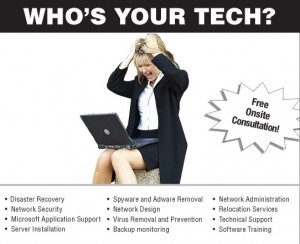Are you protecting your intellectual property and creativity?

Computer security should be a top priority for everyone – but especially anyone who makes a living off of their intellectual property or creations on computers. Whether they are spreadsheets, photos, music, writing, or any form of artwork, you want to make sure they are protected. Here are several tips to help keep you and your technology secure:
- First and foremost – backups! Too many people neglect making regular backups of their data, and some find out the hard way. How often should you back up? If you lost this entire weeks’ worth of work, how far would it set you back? Most businesses backup at least once per day, and some will backup multiple times per day. Backups can be automated to run on a schedule, and can be either local copies you maintain, or stored on a remote server. Discuss with a professional which is best in your scenario.
- Test your backups! Probably the next worst thing to not having a backup at all is thinking that you have one, and then finding out it was only a partial backup, or the backup itself was corrupt. Either you or your trusted technology advisor should perform a ‘disaster recovery’ test every so often to verify that your backups are both successful and complete in the event they are ever needed. Do not wait until it is too late and could cost hundreds or thousands in data recovery services.
- Make sure your passwords are both secure and complex. “Password” or “1234” are not sufficient passwords for any use – you might as well not even have one? Hackers are using programs that go through either dictionary-like lists of names and passwords, or use ‘brute-force’ attacks stepping through every possible combination of a password until they get a successful return. Once they have it, they do not need to change your password to lock you out – in fact, they do not want you to know they have it because as long as you are not suspicious, they have free reign over your data/systems. Change your password at a regular interval, and please use something of substance/complexity. A good password contains 8+ characters, both upper and lower case letters, with numbers, and even possibly a symbol. Stay away from names, birthdates, etc, or anything else easy to guess.
- Phishing Sites. A phishing site is one that looks like the real site, but is looking for you to enter your name and password, or other personal information. Always look at your address bar if ever in doubt, and BEFORE you enter your password. Once you enter information into a phishing site and click submit, the hacker has your information. If this happens, immediately change your password!
- Antivirus. Yes, even Mac’s are susceptible to viruses. Everyone needs to have an antivirus program, make sure it is up to date, and run scans frequently. Your computer cannot run a virus scan at 3am if your system is turned off. Find out what day/time your scheduled scan is to run, and make sure your system is on. Most antivirus programs try to have their scan run in the ‘off’ hours, so it does not impact your performance. The average virus scan can take anywhere from 30 minutes, up to 2+ hours, depending on the speed of your system and the amount of data to be scanned.
- Virus pop-ups. Be on the lookout for suspicious pop-ups or websites that say you are infected with a virus. BEFORE YOU CLICK ON ANYTHING, ASK! Most of these pop-ups or pages are the virus (called Trojans), and want you to think they are doing something good for you, when in reality they are the virus and about to infect your system. More often than not, you have the ability to prevent the virus if you get one of these messages – as long as you do not click on it and allow the virus to install itself and become active. Can’t close the page? Shut your system down – a restart might be safer than constantly clicking to attempt to exit from these messages. And, never feel that just because you have an antivirus program that you are impervious. The first thing these Trojans will do is disable your antivirus and invite their friends to wreak havoc on your system.
- Keep your software up to date. Whether it is Windows, Adobe, Office, Mac OS, or Java, it is just as important to keep your systems up to date with their software. Often times, developers will release Critical Security Updates that patch holes which have already been exploited by hackers. Without these updates, your system could be vulnerable.
- Use a trusted technology expert. Maybe a friend, family member, colleague, or an outside business – but have someone you can talk to about your computer issues or concerns. At CralynTech, we try to teach our clients as much as they would like to learn about their systems, how to use them more efficiently, and always try to answer every question to the best of our ability. We service all levels of clients, from individuals to small businesses, one computer or twenty – all of our clients receive the same respect and honest answers they deserve.

